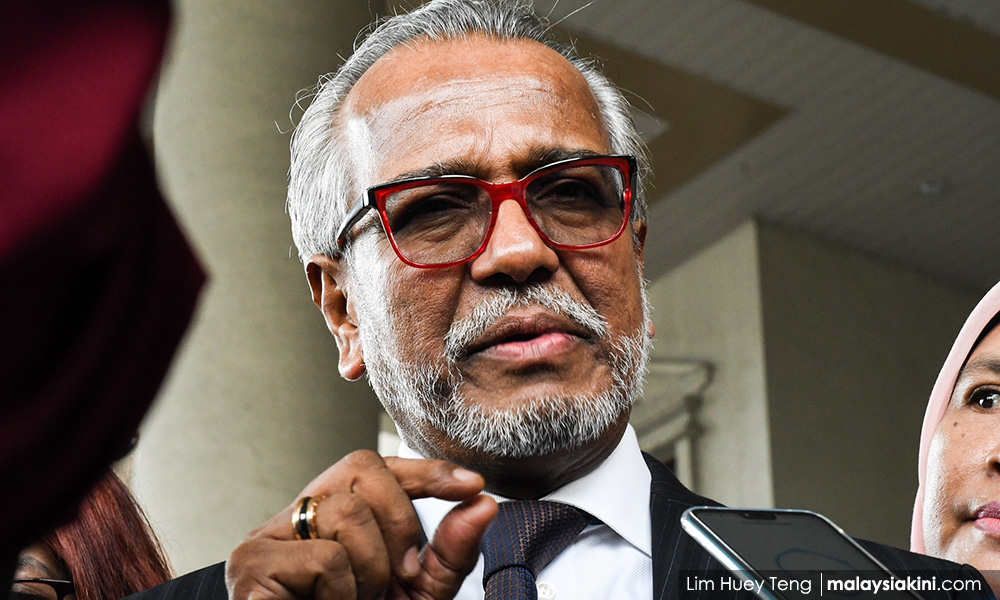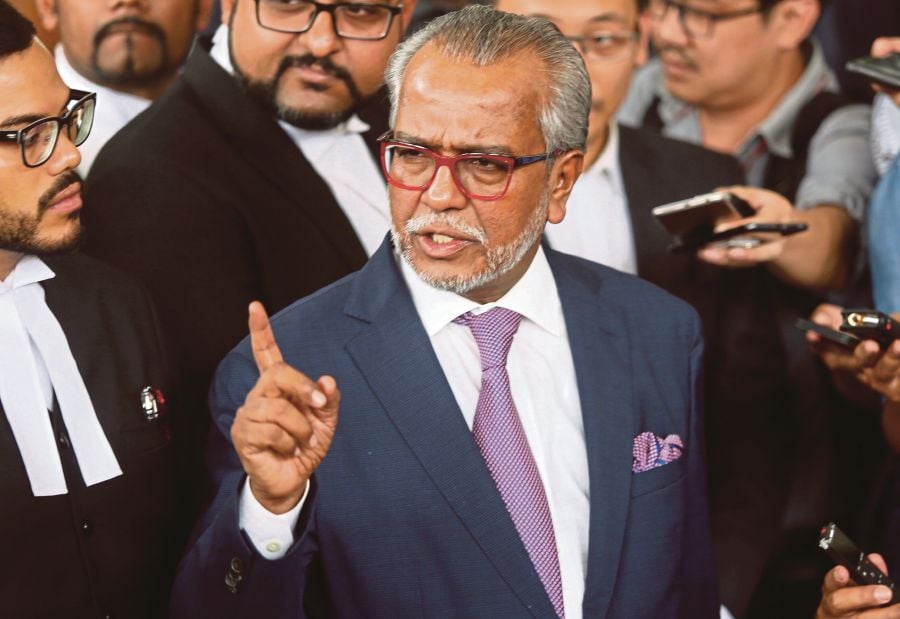Media Statement -
24/8/2018
MALAYSIA MUST REAFFIRM COMMITMENT TO ABOLISH ANTI-HUMAN RIGHTS LAWS
INCLUDING DETENTION WITHOUT TRIAL LAWS AND SOSMA
Home Minister’s 15/8/2018 Reply that Government will continue to use
SOSMA and POCA preserve national security most disturbing
MADPET(Malaysians Against Death
Penalty and Torture) is most concerned when Malaysia’s new government, vide the
Home Affairs Minister, in his Reply to a Parliamentary question dated 15/8/2018,
tells us that this government plans to continue to use draconian laws like SOSMA
[Security Offences (Special Measures) Act 2012] and POCA [Prevention of Crime
Act 1959].
‘'...Kerajaan
akan terus menguatkuasakan undang-undang untuk memelihara keselamatan negara....(Goverment will continue to enforce laws to
preserve national security...), was the words used in the response
contained in the reply by the Menteri Dalam Negeri to a Parliamentary Question
by Member of Parliament Maria Chin bin Abdullah dated 15/8/2018 who asked about
POCA and SOSMA.
The government reply also did state
that a review was being done to see if the usage of such laws are in compliance
(or consistent) with human rights norms. [‘…untuk melihat sama ada pengunaan akta-akta
ini selari dengan norma-norma hak asasi
manusia…’]
It is most disappointing when the
Malaysian government takes such a stance, and really, there is no justification
to procrastinate or delay the repealing of these and other anti-human rights
laws.
The correct position is to now
impose an immediate moratorium pending repeal of all such laws – no one else in
Malaysia should be made victims of SOSMA, POCA and other Detention Without
Trial laws, Sedition Act and such bad laws.
Is the usage of these laws in line with human rights norm?
It is a ‘bad’ joke or a foolish
proposition for this NEW government to even suggest a review to find out
whether POCA and such Detention without Trial laws are consistent with human
rights norms. It has been the stance taken by the Malaysian Human Rights Commission
(SUHAKAM), Malaysian Bar, Civil Society and Human Rights Groups, and even the
then Opposition Parties and their leaders for many years.
POCA and Detention without Trial (DWT) Laws
violates Human Rights
Detention without Trial (DWT)
laws clearly violates Human Rights.
Article 10 of the Universal Declaration
of Human Rights (UDHR) clearly states that, ‘Everyone is entitled in full
equality to a fair and public hearing by
an independent and impartial tribunal, in the determination of his rights and
obligations and of any criminal charge against him.’ DWT laws deny the
right to a fair trial, and allow the government to detain and/or restrict
persons indefinitely without trial.
Article 11(1) states, ‘(1)
Everyone charged with a penal offence has the right to be presumed innocent until
proved guilty according to law in a public trial at which he has had all the
guarantees necessary for his defence.’ Article 9 states, ‘No one shall be subjected to arbitrary
arrest, detention or exile.’
POCA and such DWT laws enable the
police (or the government of the day) to subject persons to ‘…arbitrary arrest,
detention or exile’. There is no need for any trial, or even any court order.
Worse still, is that DWT laws can be used against a person for any alleged
reason, which may also be ‘fake’ or false, and the victim cannot even challenge
the said alleged reasons used to justify the arrest, detention and/or
restrictions by way of judicial review. The judiciary’s power to ensure that
there is no wrongdoing on the part of the Executive is curtailed – the courts
cannot make sure whether an innocent person has been wrongly detained and/or
restricted for a wrong or false reason.
POCA, was amended, amongst others
in 2014, and now it is so wide that it can be used against almost anyone, which
really may not matter because the law itself prevents a challenge of the very reason
for which it was used.
Today, after these amendments, even
former Prime Minister Najib could be arrested and detained under POCA, which
now can also be used even in cases where allegedly ‘…two or more persons who
associate for purposes which include the commission of offences under the Penal
Code..’ – it now covers all offences under the Penal Code – no anymore just
crimes "involving violence or extortion".
SOSMA violates Human Rights and even denies a fair
trial
SOSMA, which may be the
replacement of the Essential (Security cases) Regulations 1975 (ESCAR), allows the police to override the existing provisions
in our Criminal Procedure Code and the Evidence Act, that really are there primarily to ensure justice be
done and human rights respected.
Our Malaysian Federal
Constitution in Article 5(4), states amongst others, ‘…(4) Where a person is
arrested and not released he shall without unreasonable delay, and in any case
within twenty-four hours (excluding the time of any necessary journey) be
produced before a magistrate and shall not be further detained in custody
without the magistrate’s authority…’.
However, if the police rely on
SOSMA, then there is no more the requirement for the police to bring the person
arrested before the Magistrate within 24 hours. The police can simply continue
to detain the ‘suspect’ for up to 28 days.
Now, the Criminal Procedure Code also sets the maximum
period of remand for the purpose of investigation is 14 days, but if SOSMA is
used, then no need to even bring the suspect before a Magistrate or get remand
orders from a Magistrate, and one can simply be detained for up to 28 days.
The bringing before a magistrate,
and the requirement of a remand order by a Magistrate is a necessary ‘check and
balance’ to prevent police abuse of their powers including torture. There have
been way too many allegations of torture and even deaths in police custody.
There were 110 lock up deaths from 2010 until 2016 in Malaysia. In a Bar statement
dated 23/4/2018, it was stated that, ‘The Malaysian Bar is appalled that two
more men have died while in police custody, within the space of merely a few
weeks.’.
The need to bring before a
Magistrate within 24 hours and the need for application to the Magistrate for further
remand orders, gives the Magistrate the opportunity to ensure no police
wrongdoings, and that these further detentions are really needed for
investigation purposes and not for some other ‘wrong’ or illegal objectives, including
maybe the ‘torture’ of suspects.
If SOSMA is relied on when a person is charged in court, bail will
be denied, meaning the accused innocent person will have to stay in prison
until his/her trial is over. Even if the court finds him/her not guilty, using
SOSMA, the prosecution could still ask that he/she continued to be detained until
the subsequent appeals are done and disposed off.
If SOSMA, is used during trial,
normal Evidential and Criminal Procedural requirements can also be ignored. What
is not admissible in normal criminal trials could become admissible if SOSMA is
used. These evidential and procedural requirements are there to ensure a fair
trial, and that justice is done.
SOSMA can only be used for
security offences, which now includes that vague newly introduced draconian
offences by past regime criminalizing all forms of ‘activity detrimental to
parliamentary democracy’(section 124B-J Penal Code) which is also under Chapter
VI – Offences Against The State.
In November 2016, Maria Chin
Abdullah(then Bersih 2.0 chairman) herself, was arrested and detained under
Section 124C of the Penal Code that prohibits the attempt to commit activities
detrimental to parliamentary democracy. SOSMA was used here..(Malay Mail, 20/11/2016)
Failure To Answer The
Question – Disclose All Answers On Parliamentary Website
In this Parliamentary Reply, the
government also did reveal that until July 2018, 592 persons were detained
under SOSMA (510 Malaysians 10 foreigners), of which 102 Malaysian and 58
foreigners have been convicted, and 408 Malaysians and 22 foreigners are remand
detainees (tahanan reman).
Is Maria Chin one of these ‘remand
detainees’? By convicted, one assumes that they have been tried in court and convicted. Does ‘remand detainees’ mean
that they, like Maria Chin, were released and never charged, or does it also
include those who have been charged in court and denied bail? The government really ought to provide clearer answers.
MP Maria Chin’s question about
the age breakdown of the victims of SOSMA and POCA were never even answered.
With regards to POCA, the answer
was that until July 2018, there are 535 being detained under POCA - 448
Malaysians 87 foreigners. Again, there was no age breakdown, and no indication
of the number of adults and the number of juveniles, which was also asked by
Maria Chin.
Malaysians were lucky that MP
Maria Chin shared the question and answer she received, but sadly we will never
know the questions and government answers from so many of our other MPs/Senators.
The Hansard is a verbatim record of what
happens in the Dewan Rakyat, but as there is no time to answer all the listed oral
questions, many answers are provided later in written form. There are also the
questions of MPs at every parliamentary session seeking written responses.
Transparency really demands that
all these questions and government’s answers now are available at the
Parliamentary website, which can be accessed by everyone.
Confusion about commitment to repeal SOSMA, POCA and Bad Laws
Several days ago, it was also
reported in the media that Datuk Mohd Azis Jamman, the still Deputy Home
Minister, who said ‘"…In my opinion, the law is good…’. He was referring to
the SOSMA, POCA and POTA, which he said "However, the law has been abused
in the past for political reasons, thus the ministry has set up a special
committee to review it along with other laws, such as Prevention of Terrorism
Act (Pota) and Prevention of Crime Act (Poca)…’(Star, 7/8/2018)
Taken together, what was stated
by the Deputy Home Minister and the Home Minister’s Reply to Maria Chin,
Malaysians may really have something to worry about – Will this new government
simply keep and continue to use these draconian laws like SOSMA, POCA and other
Detention without Trial Laws just like the past UMNO-BN government?
Government Of Many Past Victims Of Unjust Laws Must Do The
Right Thing
This Pakatan Harapan led
government is a government of many past
victims of DWT laws and unjust laws. As such, many Malaysians expected speedy
abolition of POCA and Detention Without Trial laws, SOSMA, Sedition Act and
other unjust laws, or at the very least a pronouncement that such laws will no
longer be used.
Over 100 days have passed, and we
have not yet seen the many hundreds, possibly thousands, of persons currently
being detained without trial under the Detention Without Trial laws like
Prevention of Crimes Act, Prevention of Terrorism Act and the Dangerous Drugs
(Special Preventive Measures) Act being released unconditionally. We have also
not seen the possibly thousands currently being under Restriction Orders, being
liberated of their restrictions.
MADPET calls on the Malaysian government to immediate clarify and
reaffirm their commitment to speedily repeal POCA and all Detention Without
Trial laws, and SOSMA.
MADPET also calls on the government to immediately stop the usage of
these and other draconian laws pending its repeal.
MADPET also calls on the Malaysian government to immediately release all
those currently being detained and/or restricted under Detention Without Trial
Laws, and also SOSMA.
Charles Hector
For and on behalf of
MADPET(Malaysians Against Death Penalty and Torture)




